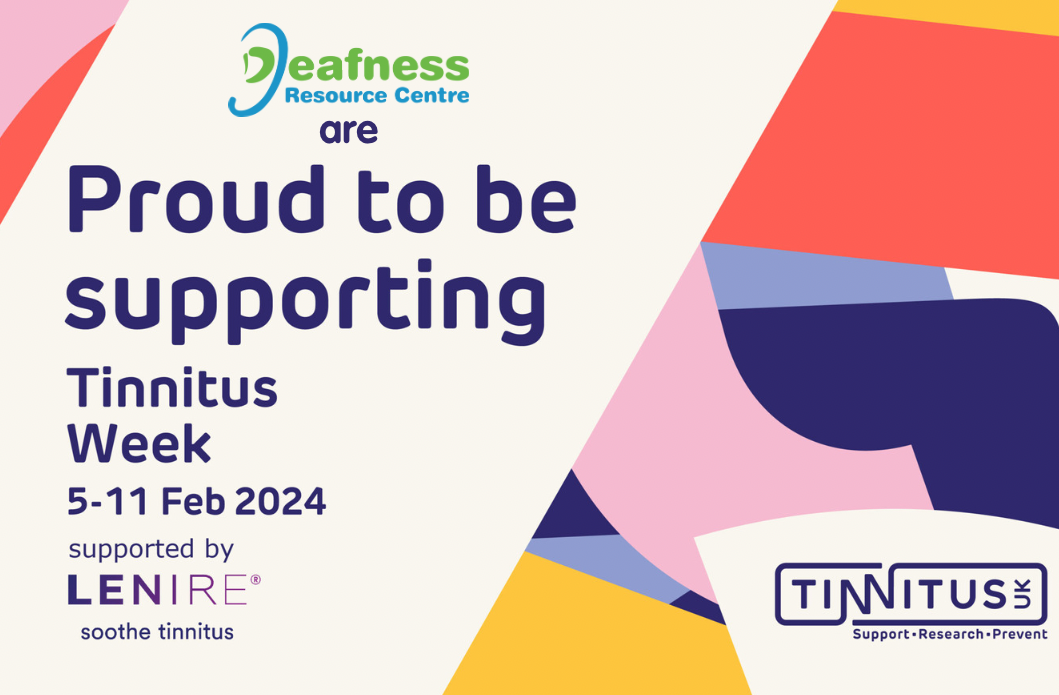
 Deafness Resource Centre can offer support and advice, both practical and emotional, from trained staff on ways in which people living with Tinnitus can support themselves to learn more about the condition. Staff work across the St Helens, Halton and Knowsley boroughs.
Deafness Resource Centre can offer support and advice, both practical and emotional, from trained staff on ways in which people living with Tinnitus can support themselves to learn more about the condition. Staff work across the St Helens, Halton and Knowsley boroughs.
We currently have Tinnitus Support Groups operating across St Helens and Halton. The self-help groups support people living with Tinnitus, offering an informal get together to share experiences with other people, access information and get support on managing Tinnitus.
The groups are supported by trained Tinnitus Advisors who can offer one to one support when needed.
The groups meet as follows:
St Helens
1st Wednesday of every month at Deafness Resource Centre
Angela Edwards for St Helens Groups
Tel: 01744 23887 or Email: Angela.Edwards@deafnessresourcecentre.org
Halton
1st Thursday of every month, alternating between Runcorn & Widnes. Please get in touch for dates.
Wendy Edwards for Halton Groups
Tel: 0151 511 8801 or Email: Wendy.Edwards@deafnessresourcecentre.org
We are here to help!
Be sure to explore our support groups page for additional information.
WHAT IS TINNITUS?
Tinnitus is a condition characterised by the perception of sound within one’s ears or head, without any external source for that sound. This often manifests as ringing or buzzing, humming, hissing, or similar noises. Individuals experiencing tinnitus hear these sounds even when there is no corresponding external sound present. Tinnitus can vary in intensity and frequency, and it may be temporary or chronic. It can stem from various underlying factors, such as exposure to loud noises, age-related hearing loss, ear infections, or specific medical conditions. Tinnitus can prove bothersome and people struggle to find the right tinnitus treatment, impacting a person’s quality of life and leading to difficulties with concentration, sleep disruption, and emotional distress. Understanding tinnitus plays an important part in learning how to cope with the condition and manage it more effectively.
DIAGNOSIS: WHAT ARE THE CAUSES OF TINNITUS?
For people with tinnitus, pinpointing a single cause for tinnitus is complex. Alongside being an indicator of in-ear damage, the cause of your tinnitus tinnitus can be triggered by exposure to high levels of noise. It’s not clear exactly what causes tinnitus, but it’s thought to be a problem with how the ear hears sounds and how the brain interprets them.
It’s important to note that our ability to hear relies on delicate hair cells in the inner ear, known as the cochlea. These cells translate the sounds collected by our ears, converting them into electrical impulses that our brain recognises as audible sound.
One of the prevalent tinnitus causes is noise-induced hearing loss. This results from damage to the sensory hair cells in the inner ear due to prolonged exposure to loud sounds like loud music or occupational noise. The continual exposure wears down these hair cells, leading to hearing loss.
Pulsatile tinnitus is another type, linked to interruptions in blood flow to the ears. Conditions such as high blood pressure or diabetes can contribute to this. Such interruptions reduce oxygen supply to the cochlear hair cells, causing damage and potentially leading to permanent hearing loss or tinnitus.
Tinnitus can also relate to age-related hearing loss, earwax accumulation, ear infections, head injuries, anxiety, or depression. Often, individuals with tinnitus might not show evident ear or hearing issues, making it more challenging to understand and manage.
MORE INFORMATION: WHAT ARE TINNITUS SYMPTOMS?
We want to create a better understanding of tinnitus to help relieve some of the distress it may cause. The symptoms of tinnitus can often be individuals may perceive sounds in one or both ears. These sounds, situated within their headspace, can be challenging to distinguish from external noises. Their frequency, volume, and duration can vary, making it difficult to discern their origin. These sounds may persist or fade quickly. Some individuals experiencing tinnitus intermittently throughout the day, while others have continuous sounds. The perception of noise might be faint at times and overwhelming at others, affecting concentration. After exposure to loud music, such as at a concert, symptoms can intensify.
HOW CAN TINNITUS AFFECT QUALITY OF LIFE?
Tinnitus experiences vary. Generally, tinnitus is not nescessarily a sign of a severe underlying condition and might only be a minor annoyance that subsides.
However, for some, it significantly impacts daily life and causes distress. High-pitched sounds and ringing in your ears can disrupt concentration and lead to sleep difficulties, potentially triggering anxiety and depression without adequate support.
Day-to-day challenges may encompass difficulties in conversations and heightened stress. Over time, tinnitus might naturally improve or become more manageable through habituation, where individuals can change the way they feel and adapt to the condition.
STRATEGIES TO IMPROVE THE LIFE FOR INDIVIDUALS LIVING WITH TINNITUS
-
Seek Professional Guidance
The first step for anyone with tinnitus is to consult a healthcare professional, preferably an ear, nose, and throat specialist or an audiologist. They can help determine the underlying cause of tinnitus and provide guidance on appropriate treatments which may help reduce some of the symptoms. Tinnitus is rarely a sign of a serious medical condition but sometimes, tinnitus can be a symptom of an underlying medical condition that requires attention, so it is important to get a diagnosis and discuss treatment for tinnitus. Please seek professional guidance if you have severe or persistent tinnitus.
-
Sound Therapy
Sound therapy involves using external sounds to mask or distract from the ringing in the ears. Low-level white noise machines, nature sounds, or soothing music can be used to create a more pleasant auditory environment. These sounds can help individuals help you cope and focus on something other than their tinnitus, making it less noticeable and the tinnitus symptoms less bothersome. At Deafness Resource Centre and Halton Sensory Services, we can offer various sound therapy equipment (which may relieve tinnitus) for free if you live in St Helens, Halton and Knowsley.
-
Cognitive Behavioural Therapy (CBT)
CBT is a psychological therapy that can be highly effective in managing and reducing tinnitus. A trained therapist can help individuals change their thought patterns and reactions to tinnitus, reducing the emotional distress it may cause. CBT techniques can help people cope with the anxiety, depression, or stress often associated with tinnitus and help make tinnitus less noticeable. CBT can often be an effective treatment in our responses to the condition.
-
Medications
In some cases, medication may be prescribed to manage tinnitus symptoms. While there is no specific medication to cure tinnitus, certain drugs, such as tricyclic antidepressants or anti-anxiety medications, may help alleviate the emotional distress and help you sleep better.
-
Lifestyle Modifications
Certain lifestyle changes can make a significant difference to reduce the impact of tinnitus:
a. Reduce Stress: Stress can exacerbate tinnitus symptoms. Practices like meditation, yoga, and deep breathing exercises can help manage stress levels. So do practice relaxation as this may provide relief for some people as stress may make tinnitus worse.
b. Limit Exposure to Loud Noise:Protect your ears from loud noises, as exposure to loud sounds can worsen tinnitus. Use earplugs or noise-canceling headphones in noisy environments.
c. Limit Caffeine and Alcohol: These substances can sometimes worsen tinnitus. Reducing their consumption may lead to improvements.
d. Maintain a Healthy Lifestyle: Eating a balanced diet, getting regular exercise, and getting enough sleep can help improve overall well-being and potentially reduce the severity of tinnitus.
-
Hearing Aids
For individuals with tinnitus who have hearing loss, hearing aids can be a valuable solution. These devices amplify external sounds, making them easier to hear and reducing the perception of tinnitus. Additionally, some hearing aids come with built-in sound therapy features which can help make your symptoms more managable.
-
Support Groups
Joining a tinnitus support group or seeking support from friends and family can provide emotional assistance and a sense of community. Sharing experiences and coping strategies with others who understand the challenges can be incredibly beneficial. Please visit our page that details when and where our support groups are on.
Conclusion:
Living with tinnitus can be challenging, but it is possible to improve one’s quality of life and relieve tinnitus symptoms through a combination of professional guidance, therapies for tinnitus such as cognitive behavioural therapy or sound therapy, medication, lifestyle modifications, hearing aids, and support networks. It’s essential to remember that what works best may vary from person to person, and it may take time to find the most effective strategies for managing tinnitus. With patience and persistence, individuals can learn to coexist peacefully with their tinnitus and lead fulfilling lives.
Deafness Resource Centre can offer support and advice, both practical and emotional, from trained staff on ways in which people living with Tinnitus can support themselves to learn more about the condition. Staff work across the St Helens, Halton and Knowsley boroughs.
We currently have Tinnitus Support Groups operating across St Helens and Halton. The self-help groups support people with Tinnitus, offering an informal get together to share experiences with other people, discuss how tinnitus can affect their lives and access information and get support on managing Tinnitus. Our aim to to help reduce the distress tinnitus can cause, and whilst there is no cure for tinnitus we endeavour to help you manage your symptoms.
The groups are supported by trained Tinnitus Advisors who can offer one to one support when needed. The training our staff receive is from the British Tinnitus Association, www.tinnitus.org.uk
The groups meet as follows:
St Helens
1st Wednesday of every month at Deafness Resource Centre
Angela Edwards for St Helens Groups
Tel: 01744 23887 or Email: Angela.Edwards@deafnessresourcecentre.org
Halton
1st Thursday of every month, alternating between Runcorn & Widnes. Please get in touch for dates.
Wendy Edwards for Halton Groups
Tel: 0151 511 8801 or Email: Wendy.Edwards@deafnessresourcecentre.org
You can also discover more about Tinnitus on the Tinnitus UK website by clicking on the link below:


